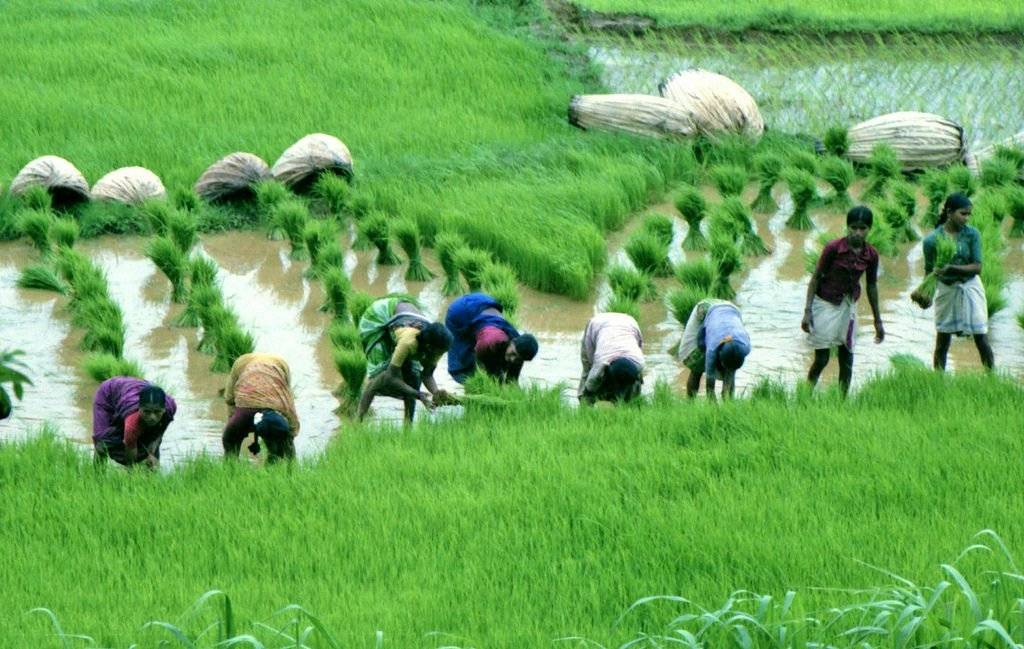
At COP26, CGIAR on Monday urged global leaders to ensure the 500 million smallholder farmers responsible for up to a third of global food production can adapt to climate change-induced loss and damage while curbing their greenhouse gas emissions…reports Vishal Gulati.
Rice is a staple crop in India as well as in many parts of Asia and Africa, but climatic extremes including rising sea levels — which causes inland salinisation — can seriously affect its production.
The adoption of ‘climate-smart’ rice has led to significant increases in yield in climate change stress-affected areas, including those inhabited by the most impoverished farming communities. The drought-tolerant Sahbhagi Dhan variety is specifically deployed in India.
At the ongoing 26th Conference of Parties to the UN Framework Convention on Climate Change (COP26) in this Scottish city, CGIAR Managing Director (Research, Delivery and Impact) Claudia Sadoff talked exclusively to IANS in the context of how to help farmers to become “climate smart”, improving productivity and resilience while reducing emissions.
She said large-scale flooding is occurring with greater frequency in South Asia with many of the region’s most vulnerable people, who live in vast agrarian belts within the Indus, Ganga, and Brahmaputra-Meghna river basins, being the worst affected.
Index-Based Flood Insurance (IBFI) designed by CGIAR researchers combines satellite imagery with mathematical modeling to calculate flood damage and verify claims, avoiding the need for costly field visits and thus keeping premiums affordable and giving smallholders a valuable lifeline.
As another example, she said that a CGIAR project in Gujarat led to 3,500 farmers gaining access to solar irrigation offering excellent mitigation potential where the majority of irrigation pumps are diesel.
“Farmers also have a 25-year agreement with the local power utility to buy back surplus power, thus increasing energy access and alternative income while incentivising smart groundwater use and reducing carbon footprints.
“The success of the pilot inspired a multi-billion-dollar government of India initiative to promote solar irrigation,” she said.
CGIAR is the largest global research partnership working towards sustainable and resilient agriculture and technology it has developed has helped yields triple in Europe and North America.
At COP26, CGIAR on Monday urged global leaders to ensure the 500 million smallholder farmers responsible for up to a third of global food production can adapt to climate change-induced loss and damage while curbing their greenhouse gas emissions.
Innovations are needed that can both reduce the contribution of global agriculture to climate change, and adapt to its increasingly evident consequences while also supporting livelihoods, nutrition and equality.
The call comes as the UK pledged $55 million over two years to boost commitments to CGIAR research from a steadily growing global coalition to surpass $1 billion.
The new pledges will contribute to an accelerating of research and innovation to confront rapidly intensifying climate challenges that could upend the global fight against hunger and poverty.
The first week at COP26 delivered significant support for climate innovation for farmers across the developing world. Pledges to CGIAR came from the Bill & Melinda Gates Foundation and countries including the US, Canada, Sweden and Belgium, and now the UK.
Sadoff told that Indian rice farmers face a heavy toll from flooding just after crop sowing.

Recurring impacts of floods in India necessitate improving farmers’ knowledge of adaptation and coping methods along with improving flood-resilient infrastructure to reduce the damaging impacts on farming communities.
Swarna-Sub1, a submergence-tolerant rice variety developed within CGIAR, could play an important role in minimising the effect of flood on rice production. A recent study shows that the variety could be most beneficial for flood adaptation in districts of Bihar, West Bengal, and Uttar Pradesh, she said.
On the rice stubble burning in northern India that has long been a major cause of air pollution, she said CGIAR research has made a significant difference toward efforts to stop the harmful practice of rice straw burning, by providing a more ecologically friendly alternative.
“Zero tillage provides farmers with a mechanised alternative to burning and tilling land between the rice harvest and wheat planting season.
“The approach instead offers a way to sow wheat directly into unplowed paddies and rice straw, using innovative machinery and attachments that can chop the leftover rice stalks, spread the residue evenly as mulch, and plant seeds into the soil — all without the need for clearing.”
According to her, the climate crisis is exacerbating the degradation of food, land, and water systems, impacting productivity, viability and resilience.
“Business as usual will mean that zero hunger will be an unattainable goal. Food value chains that exploit natural resources beyond planetary boundaries, resulting in waste generation, deforestation, water pollution, ecosystem destruction, and biodiversity loss are a global problem.

“Combined, these impacts increase the vulnerability of the people whose lives and livelihoods depend on them — to extreme events and other shocks such as Covid-19.”
A key objective of CGIAR is to increase the resilience of smallholders who are on the frontline of climate change and there are many examples of climate smart innovations that have already been developed and many more in the pipeline.
ALSO READ-HC vacates stay on Vijaypat Singhanias autobiography


